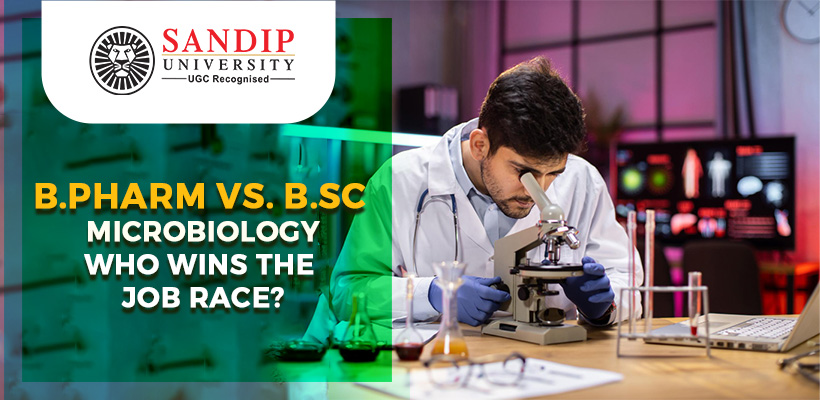Are you planning to do your graduation in microbiology or pharmacy? Do you know the career scope with these streams? Well, choosing the right stream will help you set the tone for your entire career. Therefore, to understand the best science courses after 12th and the job opportunities, read on.
Students are often confused when it comes to choosing between Bachelor of Pharmacy and Bachelor of Microbiology. In this blog, we will shed light on salary expectations, course structure, and career prospects so that you can make an informed decision. Hence, it is a guide that will help you decide your future course of action relating to B.Pharm vs. B.Sc Microbiology.
Overview of B. Pharm vs. B.Sc in Microbiology:
B.Pharm
- 4-year degree course
- Passed (10+2) with 50% aggregate score in Physics, Chemistry, Biology or Physics, Chemistry, Mathematics
- You may need to appear for entrance exams. Thus, verify with the university about it.
Core subjects include:
- Pharmacology
- Pharmaceutics
- Pharmacognosy
- Pharmaceutical Chemistry
- Biochemistry
B.Sc in Microbiology
- 3-year degree course
- Passed (12th standard) with 50% aggregate in science subjects, that is, biology, physics and chemistry
- You may be required to appear for entrance exams, so verify with the university.
Core subjects include:
- Immunology
- Molecular Biology
- Bacteriology
- Microbial Ecology
- Virology
- Microbial Genetics
Bachelor of Pharmacy and Bachelor of Microbiology are two different professional courses that drive you towards different industries with a promising career.
Comparing the Course Structure and the Curriculum:
B.Pharm
Bachelor of Pharmacy is a four-year course that is divided into 8 semesters, which means 6 months for 1 semester.
The curriculum includes:
- Hospital and clinical pharmacy – You receive formal training and education to become dedicated professionals who are in charge of patient care, drug supply, and prescription understanding in a hospital setting.
- Human anatomy and physiology – Students learn about the human body and its parts and understand how drugs interact and react with it.
- Pharmacognosy – One of the most crucial parts of B. Pharm is to know about the natural products and the medicinal plants that are used in producing drugs.
- Pharmacology – The part of the syllabus where you are taught the impact of drugs on your body. You will also understand their mechanism of action after consumption.
- Pharmaceutics – You will be taught about the drug formulation as well as the safest delivery systems to ensure there are no glitches.
- Regulatory affairs – When studying B. Pharm, it is mandatory for the students to have optimum knowledge about the drug laws, ethical guidelines, and patents.
- Pharmaceutical chemistry – It is the part where you study about the chemical aspects of drug designing and its synthesis for better utilisation.
- Practical training – Students of B. Pharm must have optimum knowledge and receive training on laboratory work, industry visit to gain practical experience, and internships.
B.Sc in Microbiology
- Microbial diversity – This topic will cover identification, classification, and study of diverse microorganisms for better understanding.
- Parasitology – It is the study where you are taught about parasites and their interactions with their hosts.
- Mycology – This is a topic that discusses fungi and their activities.
- Cell Biology – This subject covers the function and the structure of prokaryotic and eukaryotic cells.
- Virology – It is the study of viruses, replication, their composition, and their interactivity with the host cell
- Biochemistry – When studying this topic, you will learn about the chemical process within living organisms that includes the structure, function, nucleic acid, proteins, and carbohydrates.
- Recombinant DNA Technology – This is the process where you will learn about the techniques that are useful in manipulating the DNA for different applications.
- Microbial genetics – Students will explore the genetic mechanism in microorganisms that includes gene transfer, mutation, and genetic engineering.
- Immunology – Discover about the human body system that is immunity and the significant role it plays in protecting against microbial infections.
The Career Scope after B. Pharm and B. Sc in Microbiology:
Pharm Career Scope
- Pharmacy Practice
- Pharmaceutical industry
- Government and regulatory bodies
- Clinical research
- Academics and research
- Entrepreneurship
B.Sc in Microbiology
- Health-care industry
- Research and development industry
- Industrial microbiologist
- Environmental microbiologist
- Food technologist
- Pharmaceutical scientist
- Agricultural biologist
Industry Growth and Government Support:
B.Pharm industry
The Indian pharmaceutical industry is growing at an exponential rate and is supposed to achieve another milestone by 2030. It is driven by increased demand for health-care, innovation in biotechnology, and generic drug exports. The Indian Government has diverse schemes that boost the production and R&D of the industry. There are sufficient policies by the government, such as FDI, increased health-care budget, drug approval reform, and enhancements.
B.Sc in Microbiology
Similarly, the microbiology field is growing at a rapid pace with the expansion in health-care, agriculture, biotech, food safety, etc. Thus, there is and will be job opportunities in microbiology for microbiologists by 2030.
There are several government-funded programs related to microbiology projects for the public health-care sector.
If you desire to study in one of the best private colleges in Nashik, Maharashtra then learn about the best science courses after 12th offered by Sandip University.
Things to Remember:
1. Which is a better option: B. Sc in Microbiology or B. Pharm?
B. Pharm is a professional course that prepares you for the pharma industry. B. Sc in Microbiology has broader skills along with diverse career choices in different sectors.
2. Which is the highest-paid job for B. Pharm?
Pharmaceutical scientists or researchers are the highest-paid professionals in the pharmacy field.
3. Which is the highest salary for B. Sc in Microbiology?
Those people who prefer entering the R&D department or assisting in conducting experiments receive a higher salary compared to other professional positions.

